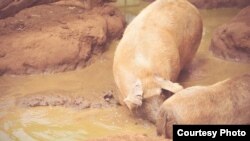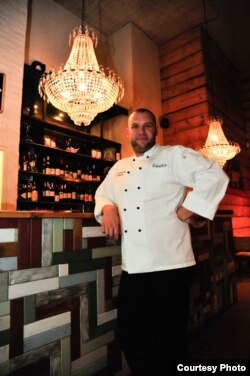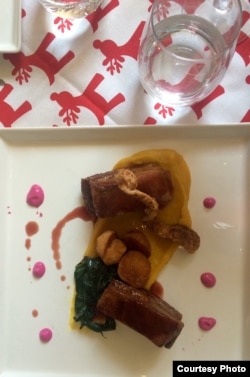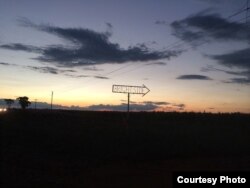James Diack describes himself and his mother as “accidental” pig farmers.
“My mother saw this very thin pig at an auction a couple of years ago. She chased around trying to find out who was responsible for abusing it," he said. Eventually, she found the owner, paid for the pig and brought it home, "because she felt sorry for it."
Next came the boar farming, also accidentally.
"Some guy imported them from Italy," Diack said. "And he then duly, unfortunately, passed away, and his family was like, ‘Well, we don’t want these things.’ So I phoned my mom, and that’s how we became wild boar farmers."
And what do you get when you cross a pig and a boar? There's no catchy name for it (a pigbo? a hyboarapig?), but the hybrid is flourishing at Diack's Brightside Farm in the Magalies Mountains, north of Johannesburg.
The farm boasts six hectares of manicured garden and eight hectares of organic vegetable garden, along with meadows where sheep, cows, and pigs roam freely.
"There are no fences," he said, "so the animals go where the animals need to go. It’s absolutely nonrestrictive farming.”
Diack, who’s also a chef, farms the land with his mother, Janet. Brightside supplies his city restaurant, Coobs, with fresh organic produce and meat.
“Particularly our pork, we’re very proud of. … All free-range. It’s our own hybrid," he said. "So what we did is we took land-raised pigs and crossed them with wild boar. So it’s a 50-50 mix. That reduces your fat and increases your meat content and your flavor.”
‘Fuzzy’ hybrids
Diack said his hybrid wild boars look like commercial pigs, only they’re “fuzzy.”
“Because they’re free range, they’ve grown a sort of a thin hair covering," he said. "They’re dark; most of them are brown with patches. They’re more adapted to the South African sun, which as we all know is exceptionally hot, as opposed to your pink, sort of Vienna [sausage] looking pig. The hair protects their skin from the sun.”
The farmer described his pigs as “amazing” and “very intelligent.”
“They always have their snouts in the ground, foraging, and they’re actually very important to the ecology of our farm because they till the soil for us,” Diack said.
He said that his pork tastes so good because his pigs eat natural foods.
“Fallen fruit and vegetables all over the farm, and then something that is the icing on the cake,” Diack said. “We have an oak forest on our farm, so the basis of their diet is acorns. We’re very proud of the fact that we breed acorn-fed pigs.”
He said he learned the “acorn trick” in Spain, a country he thinks produces the best pork in the world.
“In northern Spain, I tasted pork and I thought, ‘Wow! This is different stuff. …’ Then I found out that the wild boars there feed on acorns. ... It gives the pig this sort of a lighter, less musty, boary flavor — a delicious, almost sweetness and a nuttiness,” Diack said.
Treating pigs with dignity
His boar meat is very dense and much leaner than fatty, mass-produced pork.
Diack said this is because his animals are always active outdoors, developing more muscle, and aren’t fed artificial growth supplements.
He said most large commercial pig farms, in his opinion, don’t show respect to the animals.
“I understand that we can’t all be free-range (farmers) and the pigs can’t skip through the fields," Diack said. "But why can’t an animal grow up in a clean sty and be loaded onto a truck ethically and not overpacked and forced into an abattoir and butchered, inhumanely slaughtered and left lying there?”
Diack added, “When we were looking for a pig breed to cross with the wild boars, we got some pigs in from a commercial farm. We had to slaughter them within three weeks because they got the most terrible skin cancer from the sun. They had been bred to exist in darkness, in a covered feedlot, from birth till slaughter. That’s the kind of abominations that exist in the world of mass-produced pork.”
“I’m not a hypocrite," he said. "I’m not a vegetarian; I eat animals. But there’s got to be a certain amount of dignity shown to the animals I eat.”
Diack maintained that he indeed treats his boars with dignity, in life and in death. A mobile butcher visits his farm to slaughter the animals speedily and humanely.
“The pigs are dead before they even know what’s happening,” he said.
The meat then goes to the Coobs restaurant, where chefs use Diack’s boars from “nose to tail.”
“We use the whole animal. So we make bacon out of the forequarters, and then we make bellies, obviously, out of the belly; we barbecue the back legs. ... If something is going to give up its life, have the respect to use the whole animal,” he said.
Food mindset change
At Diack’s eatery on a busy Friday evening, some of his patrons tuck into slow-roasted pork loin with quince and potato mash, grilled apples and brandy butter sauce.
The farmer and chef said he expected ethical farming, and eating, to become ever more popular in South Africa. He said growing numbers of his clients now prize quality of food over quantity.
“Both as a food producer and as a restaurateur and chef, I consider it my duty to try to change the minds of people," Diack said. "Let’s eat less but better food. And that’s what you taste here — food that has soul, and reason, from animals that lived great, happy lives. Everything I put on a plate, I’m proud of."







